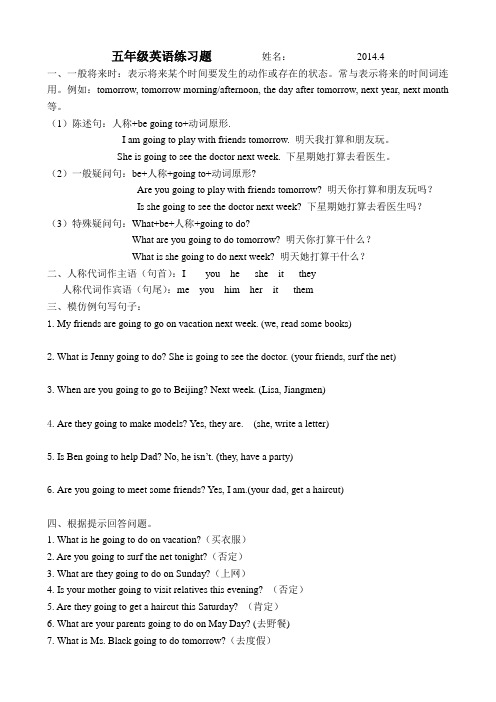英语人教版五年级下册一般将来时
- 格式:ppt
- 大小:18.50 KB
- 文档页数:4

小学五年级重点知识归纳一般将来时的用法与句型构造【小学五年级重点知识归纳:一般将来时的用法与句型构造】一、一般将来时的用法一般将来时表示将来某个时间会发生的事情或者存在的状态。
它通常用来表达计划、打算、预测、意愿等。
二、一般将来时的句型构造1. 肯定句结构:主语 + will + 动词原形 + 其他成分例句:I will go to the park tomorrow.2. 否定句结构:主语 + will not / won't + 动词原形 + 其他成分例句:She won't eat dinner with us tonight.3. 疑问句结构:Will + 主语 + 动词原形 + 其他成分?例句:Will they visit their grandparents this weekend?4. 特殊疑问句结构:特殊疑问词 + will + 主语 + 动词原形 + 其他成分?例句:Where will you go on your vacation?三、一般将来时的常见时间状语1. tomorrow(明天)2. next week(下周)3. in the future(将来)4. soon(很快)5. in a year(一年后)等等四、一般将来时的其他用法1. 表示预测或推测的句子,常使用的词汇有:think,believe,hope,expect等。
例句:I think it will rain later.我认为一会儿会下雨。
2. 表示意愿、请求、建议等情态动词的用法。
例句:I will help you with your homework.我会帮你写作业。
五、一般将来时使用注意事项1. 在一般将来时中,主语为第三人称单数时,动词要加上“s”或者“es”。
例句:He will playsoccer with his friends tomorrow.2. 一些动词在一般将来时的变化形式是不规则的,需要特别注意。




五年级英语练习题姓名:___________ 2014.4一、一般将来时:表示将来某个时间要发生的动作或存在的状态。
常与表示将来的时间词连用。
例如:tomorrow, tomorrow morning/afternoon, the day after tomorrow, next year, next month 等。
(1)陈述句:人称+be going to+动词原形.I am going to play with friends tomorrow. 明天我打算和朋友玩。
She is going to see the doctor next week. 下星期她打算去看医生。
(2)一般疑问句:be+人称+going to+动词原形?Are you going to play with friends tomorrow? 明天你打算和朋友玩吗?Is she going to see the doctor next week? 下星期她打算去看医生吗?(3)特殊疑问句:What+be+人称+going to do?What are you going to do tomorrow? 明天你打算干什么?What is she going to do next week? 明天她打算干什么?二、人称代词作主语(句首):I you he she it they人称代词作宾语(句尾):me you him her it them三、模仿例句写句子:1.My friends are going to go on vacation next week. (we, read some books)_________________________________________________________2.What is Jenny going to do? She is going to see the doctor. (your friends, surf the net)__________________________________________________________3.When are you going to go to Beijing? Next week. (Lisa, Jiangmen)__________________________________________________________4.Are they going to make models? Yes, they are. (she, write a letter)___________________________________________________________5.Is Ben going to help D ad? No, he isn’t. (they, have a party)____________________________________________________________6.Are you going to meet some friends? Yes, I am.(your dad, get a haircut)____________________________________________________________四、根据提示回答问题。

五年级下册1~10模块儿一般将来时的句子。
1.There will be a concert tomorrow.明天将有一场演唱会.2.There is going to have a English test next Monday.下周一将有一次英语测验.3.There will be rain this evening.今晚要下雨.4.There will be a bad news for you.将有一个坏消息给你.5.There will be a good news for you.将有一个好消息给你.6.There will be a English class this afternoon.今天下午有一节英语课.7.There will be a show on the playground the day after tomorrow.后天操场上将有一场表演.8.There will be a mobile phone tomorrow for me.明天我将有一部手机.9.There will be television in our classroom.我们教室将有一台电视机.10.There will be a new dress for her.她将有一条新裙子.11.There will be a delicious supper for us .我们将有一顿美味的晚餐.12.There will be a gift for me.我将有一份礼物.13.There will be a comfortable room for you tomorrow.明天你将有一个舒适的房间.14.There will be a romantic wedding for you tomorrow.明天你将有一场浪漫的婚礼.15.There will be a happy journey for her.她将有一个愉快的旅程.。
五年级英语语法汇总:一般将来时一般将来时——将来做某事A、构成形式:(1)主语+be going to+动词原形+其他。
(2)主语+will+动词原形+其他。
B、判断依据:一个句子中既有be动词,又有going、to和动词,且动词用的是原形,句中往往有tomorrow、soon、next week等词。
C、句型变换:She is going to have a picnic tomorrow.She isn’t going to have a picnic tomorrow.Is she going to have a picnic tomorrow?Yes, she is. / No, she isn’t.They are going to visit their grandparents next Sunday.They aren’t going to visit their grandparents next Sunday.Are they going to visit their grand parents next Sunday?Yes, they are. / No, they aren’t.练一练:A、根据中文,完成句子,每空一词。
1)我打算明天和朋友去野炊。
I _____ _____ _____ have a picnic with my friends. 或者:I _____ have a picnic with my friends.2)下个星期一你打算去干嘛? 我想去打篮球。
-What _____ _____ _____ _____next Monday? -I ___ _____ ___ play basketball. 或者:-What _____ you do next Monday? -I _____ play basketball.3)你妈妈这个周末去购物吗?是,她要去买一些水果。
一般将来时五年级summerholidayandholida【提纲】一般将来时五年级summer holiday and holiday activities一、一般将来时的概念和构成1.一般将来时的定义2.一般将来时的构成:will + 动词原形二、五年级summer holiday 的将来时表达1.肯定句:I will + 动词原形2.否定句:I will not + 动词原形3.疑问句:Will + 动词原形+ 其它部分?三、holiday activities 的将来时表达1.肯定句:We will + 动词原形2.否定句:We will not + 动词原形3.疑问句:Will + 动词原形+ 其它部分?四、一般将来时的实际应用1.描述将来的计划和打算2.询问将来的活动和计划3.表达将来的意愿和期待在五年级的英语学习中,我们开始接触到一般将来时。
这是一种表示将来发生事情的时态。
一般将来时的构成很简单,只需要在动词原形前加上“will”即可。
例如:“I will go to the park tomorrow.”(明天我将去公园。
)在我们期待已久的summer holiday 期间,我们可以用一般将来时来描述我们的计划和打算。
比如:“I will read books during the summer holiday.”(我在暑假期间将读书。
)当然,我们也可以用一般将来时来表达我们将要进行的holiday activities,如:“We will go swimming and hiking during the summer holiday.”(我们在暑假期间将去游泳和远足。
)一般将来时不仅在描述计划和期待时非常有用,还可以在询问将来的活动和计划时发挥作用。
例如:“Will you go to the beach this weekend?”(这个周末你会去海滩吗?)通过这样的疑问句,我们可以了解别人在未来的计划,从而更好地安排我们自己的活动。
五年级下册英语四大时态
五年级下册英语通常会学习四个主要的时态:一般现在时、一般过去时、将来时和现在进行时。
以下是这些时态的简要说明:
1.一般现在时(Simple Present Tense):表示当前的常态、习
惯、事实或普遍真理。
主语+动词原形。
o例句:I play basketball every Saturday.(我每个星期六打篮球。
)
2.一般过去时(Simple Past Tense):表示过去发生的动作或
状态。
主语+动词的过去式。
o例句:She ate an apple yesterday.(她昨天吃了一个苹果。
)
3.将来时(Future Tense):表示将要发生的动作或状态。
主
语+will/shall+动词原形。
o例句:We will visit the zoo tomorrow.(我们明天会去动物园。
)
4.现在进行时(Present Continuous Tense):表示当前正在进
行的动作。
主语+am/is/are+动词的现在分词。
o例句:They are playing football in the park.(他们正在公园里踢足球。
)
这些是五年级下册英语中涉及的四个主要时态。
学生在学习过程中应该掌握这些时态的基本形态和用法,并能够灵活运用于听、说、读、写等各种语言交流情境中。
理解时态的用法有助
于学生更好地表达自己,并理解他人所说的内容。